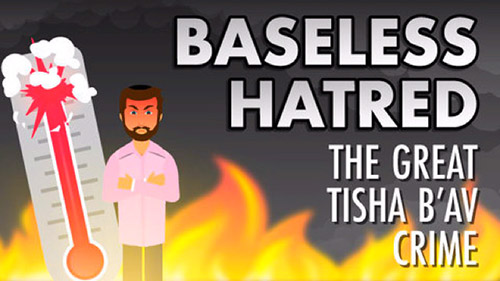
Around Tisha B’Av, every year we hear how the Temple was destroyed because of sinat chinam, “baseless hatred,” and how we need to eliminate this trait from our lives. But let me ask you: When is the last time you hated somebody for no reason at all? I’d venture to guess that most feelings of hate come from being bullied, or cheated, or maybe even something as mundane as getting cut off on the highway. But whether or not these are valid reasons for hate, none of them are baseless. So, when we talk about sinat chinam, are we talking about an obscure, irrational kind of hate that isn’t actually a problem for most of us? Or are we working with the wrong definition?
To answer this, let’s take a look at a paradigm of sinat chinam in the Talmud: the story of Kamtza and Bar Kamtza (Gittin 55b). There was a man who had a friend named Kamtza, and an enemy named Bar Kamtza. One day, this fellow makes a great feast and invites his friend Kamtza along with many important guests and rabbis. But his servant gets confused and mistakenly invites Bar Kamtza, who decides to attend. At the feast, the host spots Bar Kamtza and tells him to leave—in front of all the assembled guests. Bar Kamtza begs to be allowed to stay, first offering to pay for his own meal, then for the entire feast. But the host is so adamant that he has Bar Kamtza physically thrown out of the party.
Bar Kamtza is humiliated and enraged. And he’s especially angry at the rabbis who stood by instead of standing up for him. Out of spite, he informs the Roman authorities in Jerusalem that the Jews are secretly rebelling against them, starting a chain reaction that ultimately leads to the downfall of Jerusalem.
Now, let’s circle back. We had said that this story is the one we use as the paradigm for baseless hatred. But…why? After all, the story doesn’t seem to be a warning against irrational hate. After all, events could have unfolded the same way no matter why they hated each other, baseless or not. And as for Bar Kamtza, he certainly had good reason to be outraged at the way his host treated him. So what is the point of the story, then? And what might it be telling us about the real meaning of sinat chinam?
Let’s put ourselves in the shoes of the characters for a moment, starting with the host: Here you are putting on an extravagant feast, celebrating with your esteemed guests, and everyone is having a great time. But then you see—of all people—your bitter enemy, the man you’ve had nothing to do with for years, the man who’s only been a thorn in your side.
You don’t know about your servant’s mix-up with the guest list. All you know is that your nemesis is sitting at your party. What goes through your mind? Well, maybe you wonder why he’s there. He can’t be here to celebrate with me. All he ever does is disrupt my life. So… is that why he’s here now? Is he planning on ruining this feast somehow? Well, this time he’s gone too far.
Now let’s switch our lens over to Bar Kamtza. Out of the blue, you receive an invitation to a party from the man who’s been your foe for years. You’re suspicious, but then you wonder, maybe even hope: Is this an olive branch? You have a difficult decision to make, but in the interest of peace, you decide to attend the party. You’re enjoying the meal, coming to terms with the end of your feud, when all of a sudden, your enemy appears. He humiliates you in front of a huge crowd and demands that you leave. You beg him to let you stay, you even offer to pay for the whole party. But he doesn’t care. And, apparently, neither do the rabbis watching in silence. So, you think to yourself, I’ll get back at them all.
If we think about how the events must have looked from their perspectives, the anger of the host and of Bar Kamtza actually makes sense. They’re normal responses to the situation. But what isn’t normal is the response, the escalation. Think about it: Shouldn’t the host have relented when Bar Kamtza begged not to be humiliated? And isn’t Bar Kamtza’s betrayal of his brethren an extreme reaction to the silence of the rabbis? Each of them spiraled out of control, let their anger get the best of them, to the point that their actions weren’t rooted in the reality of the situation. In other words, the extent of their hate was baseless.
This kind of hate snowballed into the destruction of Jerusalem, and the story of Kamtza and Bar Kamtza challenges us all to manage our emotions and treat others fairly. To learn even more about this story, check out Rabbi David Fohrman’s video course, “Sinat Chinam: The Great Tisha B’Av Crime” at alephbeta.org/tisha-bav.
By Ami Silver and Daniel Loewenstein










